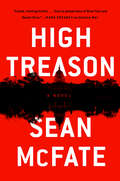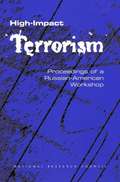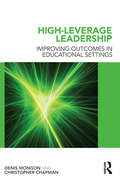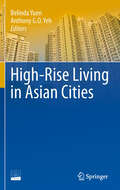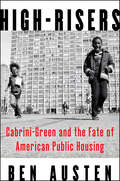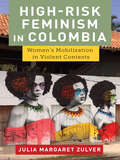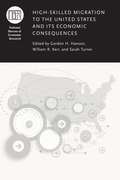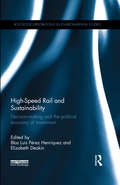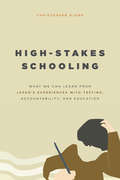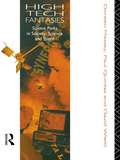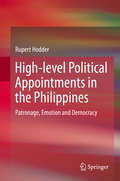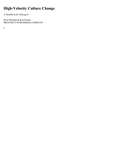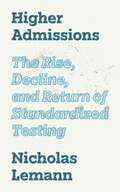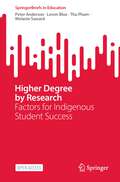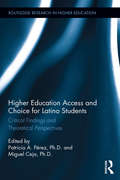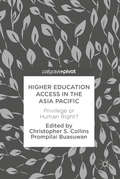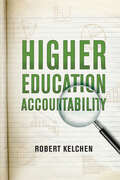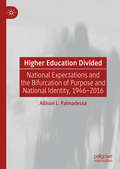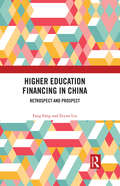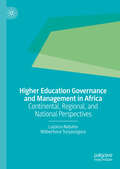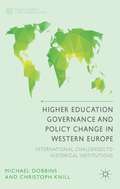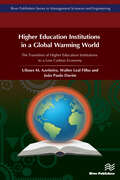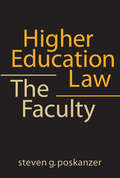- Table View
- List View
High Treason: A Novel (Tom Locke Series #3)
by Sean McFateIn this pulse-pounding action thriller perfect for fans of Brad Thor and David Baldacci, Tom Locke must stop dark forces working to overthrow the president“McFate just might be the next Tom Clancy, only I think he’s even better . . . The action is non-stop and shuttles back and forth between scary-believable and rollicking good fun. I read High Treason during a six-hour plane ride and the trip went by like the snap of my fingers.” —James PattersonWhen the US vice president’s motorcade is hit in a vicious, expertly planned attack, everyone assumes it’s terrorists—everyone except young FBI agent Jennifer Lin. Half a world away, Tom Locke has his own doubts about what happened—and who did it. He suspects his former employer, Apollo Outcomes. But why would the global private military corporation orchestrate such a brutal strike on US soil?Returning to DC, Locke teams with Lin and discovers that a civil war is secretly brewing in the military-contracting world. A division of one company has gone rogue, led by a power-hungry former colleague of Locke’s. But this man couldn’t have pulled it off without help from inside the government.Who could be pulling the strings? Only Locke can get to the bottom of the conspiracy—and blow it apart with one bold strike before it’s too late.“High Treason has brutal assassinations, shocking betrayals, even heated gun battles in the shadow of the White House. It had me breathless—from the sheer audacity of its storytelling to its breakneck pacing. It’s not to be missed!”—James Rollins, #1 New York Times–bestselling author of The Last Odyssey
High-Impact Terrorism: Proceedings of a Russian-American Workshop
by Committee on Confronting Terrorism in RussiaIn June 2001 the National Academies and the Russian Academy of Sciences held a bilateral workshop in Moscow on terrorism in a high--technology society and modern methods to prevent and respond to it. The purpose of the workshop was to begin a dialogue on high--impact terrorism that could lead to further U.S.--Russian collaboration. This volume includes papers presented at the workshop by 31 Russian and American experts on various types of high-impact terrorism, including biological and agricultural terrorism, nuclear and electromagnetic terrorism, explosives, chemical, and technological terrorism, and cyber terrorism. The papers also address legal issues, Russian internal affairs, and the future of international cooperation in this area.
High-Leverage Leadership: Improving Outcomes in Educational Settings
by Christopher Chapman Denis MongonGlobalisation of world trade, international media, technological innovation and social change are creating opportunities and challenges that today‘s pupils will inherit and build on. A pupil‘s academic, technical and social capacity will define their success or failure. Therefore, educational outcomes and well-being for young people across emerging
High-Rise Living in Asian Cities
by Anthony G.O. Yeh Belinda YuenThis book is intended to fill a knowledge gap in the study of contemporary high-rise living. While there has been much documentation on the engineering and technological aspects of tall buildings, relatively little has been written about the social and livability of high-rise. Much less is written about Asian cities even though Asia is the current hotbed of high-rise development. Even though traditional discourse of high-rise housing is not always positive, new forces are redefining its place in 21st century urbanity. Many cities around the world are reembracing high-rise in urban agenda under current narrative of sustainable development. High-rise is fast becoming a priority area in international research agenda. The quest is for livable and sustainable high-rise development. Against the background of current trends--globalization, urbanization, mixed-use development, and new-built taller buildings in inner city areas in both developed and developing countries, this book examines the software: design, economics, estate management, legal and property rights, physical environment, planning, community development, and social dimensions of high-rise living. Analysis is with the widely acclaimed successful high-rise public housing in Hong Kong and Singapore to understand the advantages and worries of high-rise living, and to distill the key points and lessons in the making of a 'good' highrise living environment. Hong Kong and Singapore have been constructing high-rise for more than four decades each. The majority of their population has moved to live in high-rise, selecting to live high-rise, and registering consistently high residential satisfaction. The height of apartment buildings in both cities continues to rise. The tallest is anticipated to be 70-storey. It is the contention of this book that contrary to earlier common negative discourses on public high-rise living, the high-rise environment may yet offer urban residents a satisfying dwelling experience. Leading housing academics, researchers and practitioners in the two cities have contributed to this book. This book presents a timely contribution to our understanding of a widening urban phenomenon that will affect a growing number of the world's population.
High-Risers: Cabrini-Green and the Fate of American Public Housing
by Ben AustenA Booklist Best Book of the Year: “The definitive history of the life and death of America’s most iconic housing project,” Chicago’s Cabrini-Green (David Simon, creator of The Wire).Built in the 1940s atop an infamous Italian slum, Cabrini-Green grew to twenty-three towers and a population of 20,000—all of it packed onto just seventy acres a few blocks from Chicago’s ritzy Gold Coast. Eventually, Cabrini-Green became synonymous with crime, squalor, and the failure of government. For the many who lived there, it was also a much-needed resource—it was home. By 2011, every high-rise had been razed, the island of black poverty engulfed by the white affluence around it, the families dispersed.In this novelistic and eye-opening narrative, Ben Austen tells the story of America’s public housing experiment and the changing fortunes of American cities. It is an account told movingly though the lives of residents who struggled to make a home for their families as powerful forces converged to accelerate the housing complex’s demise. Beautifully written, rich in detail, and full of moving portraits, High-Risers is a sweeping exploration of race, class, popular culture, and politics in modern America that brilliantly considers what went wrong in our nation’s effort to provide affordable housing to the poor—and what we can learn from those mistakes.“Compelling.” —Chicago Tribune“[A] fascinating narrative.” —Booklist (starred review)“A weighty and robust history of a people disappeared from their own community.” —Kirkus Reviews“Austen has masterfully woven together these deeply intimate stories of the residents at Cabrini against the backdrop of critical public policy decisions. Ultimately this book is about how as a country we acknowledge and deal with the very poor.” —Alex Kotlowitz, author of There Are No Children HereNamed a Best Book of the Year by Mother JonesNominated for the Andrew Carnegie Medal of Excellence in Nonfiction; the Goddard Riverside Stephan Russo Book Prize; and the Chicago Review of Books Award
High-Risk Feminism in Colombia: Women's Mobilization in Violent Contexts
by Julia Margaret ZulverHigh-Risk Feminism in Colombia documents the experiences of grassroots women’s organizations that united to demand gender justice during and in the aftermath of Colombia’s armed conflict. In doing so, it illustrates a little-studied phenomenon: women whose experiences with violence catalyze them to mobilize and resist as feminists, even in the face of grave danger. Despite a well-established tradition of studying women in war, we tend to focus on their roles as mothers or carers, as peacemakers, or sometimes as revolutionaries. This book explains the gendered underpinnings of why women engage in feminist mobilization, even when this takes place in a ‘domain of losses’ that exposes them to high levels of risk. It follows four women’s organizations who break with traditional gender norms and defy armed groups’ social and territorial control, exposing them to retributive punishment. It provides rich evidence to document how women are able to surmount the barriers to mobilization when they frame their actions in terms of resistance, rather than fear.
High-Skilled Migration to the United States and Its Economic Consequences (National Bureau of Economic Research Conference Report)
by Gordon H. Hanson, William R. Kerr, and Sarah TurnerImmigration policy is one of the most contentious public policy issues in the United States today. High-skilled immigrants represent an increasing share of the U.S. workforce, particularly in science and engineering fields. These immigrants affect economic growth, patterns of trade, education choices, and the earnings of workers with different types of skills. The chapters in this volume go beyond the traditional question of how the inflow of foreign workers affects native employment and earnings to explore effects on innovation and productivity, wage inequality across skill groups, the behavior of multinational firms, firm-level dynamics of entry and exit, and the nature of comparative advantage across countries.
High-Speed Rail and Sustainability: Decision-making and the political economy of investment (Routledge Explorations in Environmental Studies)
by Blas Luis Pérez Henríquez Elizabeth DeakinHigh speed rail (HSR) is being touted as a strategic investment for connecting people across regions, while also fostering prosperity and smart urban growth. However, as its popularity increases, its implementation has become contentious with various parties contesting the validity of socioeconomic and environmental objectives put forward as justification for investment. High Speed Rail and Sustainability explores the environmental, economic and social effects of developing a HSR system, presenting new evaluations of the proposed system in California in the US as well as lessons from international experience. Drawing upon the accumulated experience from past HSR system development around the world, leading experts present a diverse set of perspectives as well as diverse contexts of implementation. Assessments of the California case as well as cases from Japan, France, Germany, Italy, Spain, Taiwan, China, and the UK show how governments and stakeholders have bridged the gap between the vision and the realities of connecting metropolitan regions through HSR. This is a valuable resource for academics, researchers and policy-makers in the areas of urban planning, civil engineering, transportation and environmental design.
High-Stakes Schooling
by Christopher BjorkIf there is one thing that describes the trajectory of American education, it is this: more high-stakes testing. In the United States, the debates surrounding this trajectory can be so fierce that it feels like we are in uncharted waters. As Christopher Bjork reminds us in this study, however, we are not the first to make testing so central to education: Japan has been doing it for decades. Drawing on Japan's experiences with testing, overtesting, and recent reforms to relax educational pressures, he sheds light on the best path forward for US schools. Bjork asks a variety of important questions related to testing and reform: Does testing overburden students? Does it impede innovation and encourage conformity? Can a system anchored by examination be reshaped to nurture creativity and curiosity? How should any reforms be implemented by teachers? Each chapter explores questions like these with careful attention to the actual effects policies have had on schools in Japan and other Asian settings, and each draws direct parallels to issues that US schools currently face. Offering a wake-up call for American education, Bjork ultimately cautions that the accountability-driven practice of standardized testing might very well exacerbate the precise problems it is trying to solve.
High-Tech Fantasies: Science Parks in Society, Science and Space
by Doreen Massey David WieldScience parks are becoming established in increasing numbers in almost all parts of the world. Promoted as places on the frontiers of science where a new breed of scientist-entrepreneur invents a new future, extolled as high-status workplaces where a new style of employee and flexible labour process is in the making, they are seen as the potential saviours of local and national economies. High-Tech Fantasies criticises the divisive hype of science parks arguing that both the theory and practice are unproductive for the economy and for any socially progressive science and technology. Questioning responsibility, innovation and symbolism, the authors explore the mutual determination of society, science and space.
High-level Political Appointments in the Philippines
by Rupert HodderThis book questions the belief that patronage explains poor governance and weak organizations. Its focus is on high-level political appointees in the Philippines, but its implications for development processes and policy are far-reaching. Patronage stimulates the emergence of democracy and welfare, and constitutes formal organizations. So intimately connected is it with the health of democracy and effective organizations that attempts to eradicate patronage only harm social, organizational and democratic life. In developed societies this has meant a growing Puritanism interspersed with bouts of corruption and moral panic; and, as they seek to maintain effective organizations and vibrant democracies, a mounting desire to project their own anxieties and imperfections onto developing countries.
High-velocity Culture Change: A Handbook For Managers
by Price Pritchett Ron PoundHigh-Velocity Culture Change delivers 22 specific guidelines on how to manage your part of the organization for high-velocity culture change. You ll also learn how to avoid the management traps that cause most efforts to fail. This handbook will prepare you for the rigors of the agonizing process that is called culture change. It will also prove how and why the pain is well worth the cost.
Higher Admissions: The Rise, Decline, and Return of Standardized Testing
by Nicholas LemannHow to make American higher education fairerIn the 1930s, American colleges and universities began to screen applications using the SAT, a mass-administered, IQ-descended standardized test. The widespread adoption of the test accompanied the development of the world&’s first mass higher education system—and served to promote the idea that the United States was becoming a &“meritocracy&” in which admission to selective higher education institutions would be granted to those who most deserved it. In Higher Admissions, Nicholas Lemann reflects on the state of America&’s aspirational meritocracy and the enduring value and meaning of standardized testing.Lemann writes that the anticipation of the Supreme Court&’s 2023 decision banning affirmative action, plus the Covid pandemic, led hundreds of universities to stop requiring standardized admissions tests; now many colleges and universities are reinstituting test requirements. The country is preoccupied with the admissions policies of the most selective universities, but Lemann redirects our attention to an alternate path that American higher education could have taken, and can still take—one that emphasizes selective admission less and a significant upgrade of the entire higher education system more. Lemann argues that to improve the state of higher education overall, we should focus not on the narrow chokepoint of admission to highly selective colleges, but on efforts to create as much meaningful opportunity for flourishing in our vast higher education system for as many people as possible. The book includes thoughtful and challenging responses from Marvin Krislov, Patricia Gándara, and Prudence Carter.
Higher Degree by Research: Factors for Indigenous Student Success (SpringerBriefs in Education)
by Peter Anderson Levon Blue Thu Pham Melanie SawardThis open access book provides insights from Indigenous higher degree research (HDR) students on supervision practices in an Australian context. It examines findings from qualitative studies conducted with Indigenous HDR students from different academic disciplines, enrolled higher education institutions across Australia, and supervisors of Indigenous HDR students. Six types of data and their thematic analyses are presented, to understand the needs and experiences of both Indigenous HDR students and supervisors of Indigenous HDR students. This book also unpacks assumptions and commonly held beliefs about Indigenous HDR students, and shares what Indigenous HDRs report they need to experience success in higher education. It reports the experiences of supervisors of Indigenous HDR students, and explore further opportunities which enhance the higher education experiences of Indigenous HDR students. This book also suggests how successful relationships between Indigenous HDR students, and their supervisors may be fostered, and aims to be a useful resource for Indigenous peoples wishing to pursue higher education, and HDR supervisors in countries with Indigenous populations.
Higher Education Access and Choice for Latino Students: Critical Findings and Theoretical Perspectives (Routledge Research in Higher Education)
by Patricia Perez Miguel CejaNow the largest and fastest-growing ethnic population in the U.S., Latino students face many challenges and complexities when it comes to college choice and access. This edited volume provides much needed theoretical and empirical data on how the schooling experiences of Latino students shape their educational aspirations and access to higher education. It explores how the individual and collective influence of the home, school and policy shape the college decision-making process. This unique collection of original scholarly articles offers critical insight on educational pathways that will help families, educators and policy makers intervene in ways that foster and sustain college access and participation for Latino students. It considers destination preferences and enrollment selections, elementary and secondary school experiences, and intervention programs that shed light on how practitioners can promote participation and retention. This multi-conceptual, multi-methodological volume offers directions for future research, programming and policy in Latino education.
Higher Education Access in the Asia Pacific
by Prompilai Buasuwan Christopher S. CollinsThis edited volume offers empirical, evaluative, and philosophical perspectives on the question of higher education as a human right in the Asia Pacific. Throughout the region, higher education has grown rapidly in a variety of ways. Price, accessibility, mobility, and government funding are all key areas of interest, which likely shape the degree to which higher education may be viewed as a human right. Although enrollments continue to grow in many higher education systems, protests related to fees and other equity issues continue to grow. This volume will include scholarly perspectives from around the region for a more extensive understanding of higher education as a human right in the Asia Pacific.
Higher Education Accountability
by Robert KelchenThe first comprehensive overview charting the accountability of higher education.As the price tag of higher education continues to rise, colleges and universities across the country are under increasing pressure to demonstrate their value. Graded on numerous metrics, including cost and ability to prepare students for the job market, colleges must satisfy requirements from multiple stakeholders. State and federal governments demand greater accountability. Foundations and private donors, as well as today's parents and students, approach education with a consumer sensibility. How can colleges navigate these pressures while trying to stay true to their missions and values? In Higher Education Accountability, Robert Kelchen delivers the first comprehensive overview of how colleges in the United States came to face such overwhelming scrutiny. Beginning with the earliest efforts to regulate schools, Kelchen reveals the rationale behind accountability and outlines the historical development of how federal and state policies, accreditation practices, private-sector interests, and internal requirements have become so important to institutional success and survival. With so many diverse and conflicting entities holding colleges responsible for their performance, the variety of accountability systems in play can have both intended and unintended consequences. Immersed as they are in current debates about how best to respond to these pressures, faculty and administrators will welcome this up-to-date and timely account, which offers not only a look at current practices but also an examination of the future of accountability in American higher education.
Higher Education Divided: National Expectations and the Bifurcation of Purpose and National Identity, 1946-2016
by Allison L. PalmadessaThis book critically considers how tertiary institutions of higher education in the United States are charged with the duty of preserving democracy, teaching citizenship literacy, and contributing to economic stability. The author offers a comparative analysis of how presidential and national policy agendas shape these social institutions’ re-creation and re-constitution of ideological identities that influence the social position of the participants in the institution types, creating a divide in the realization of national identity across institutional and class lines. In fulfilling this role, four- and two-year institutions become representations of the social class divisions in the United States as the institutions and their students experience American national identity differently. By answering a call to serve the American public and presidential agendas, institutions of higher education reinforce the economic and social divisions in American society, resulting in varied understandings of American national identity.
Higher Education Financing in China: Retrospect and Prospect
by Fang Fang Zeyun LiuBased on theories of economics, sociology, and education, the book aims to explore the role of government and the market in China’s higher education investment. The authors comprehensively overview the characteristics of China's higher education investment system, including government funding, tuition fees, and social donations. In particular, an econometric model has been established to estimate the impact of university investment on the scale of regional higher education and average university student expenditure. Besides, they also make an international comparative analysis of the current changing trend of higher education investment structure and put forward countermeasures and suggestions to improve the government's financial and social investment in higher education. Professional scholars and postgraduate students studying Chinese higher education, the economics of education, and education finance will find this book helpful and inspiring.
Higher Education Governance and Management in Africa: Continental, Regional, and National Perspectives
by Lazarus Nabaho Wilberforce TuryasinguraThe book focuses on higher education governance and management in Africa. It is grounded in the existing studies on governance and management of higher education. It comprises four parts and 15 chapters. The themes in the book can be encapsulated into: (a) the relationship between the state and the university (or the steering models for higher education) in Africa; (b) internal university governance within the framework of the shared governance model, that is, a tripartite arrangement which comprises the corporate governance organ (the university council), the academic governance body (the university senate) and management; (c) internationalization of higher education in Africa; (d) quality assurance of higher education in Africa; (e) the third mission or the public service role of universities in Africa: (f) monitoring and evaluation of higher education; (f) external and internal higher education governance models; (g) and the regulatory agencies for higher education in Africa which has been triggered by the extension of the regulatory state into higher education.
Higher Education Governance and Policy Change in Western Europe
by Michael Dobbins Christoph KnillThis book provides a comparative analysis of the impact of 'soft Europeanization' on higher education governance in Western Europe. Using concrete indicators of policy change, it focuses on university reform in Italy, France, Germany and the UK to explore how historical legacies and transnational communication have impacted policy pathways.
Higher Education In The American West
by Lester F. Goodchild Richard W. Jonsen Patty Limerick David A. LonganeckerIn two volumes, editors Lester F. Goodchild, Richard W. Jonsen, Patty Limerick, and David A. Longanecker, working with eminent historians, policy analysts, and university leaders, provide a comprehensive overview of the role of education in the American West and the relationships between individual states and their institutions of higher learning. The volumes examine the states from North Dakota and the mountain West to Alaska and California, treating each both individually and as a part of the region; they provide concise, detailed information about each one's history, development, and current policies. One volume spans two hundred years of history, while its companion focuses on clarifying seven key public policy challenges facing higher education in the West today. Together, they make essential reading for higher education policymakers, scholars, and anyone who wants to know what the relationship between states and universities in the West has been and what its future might be.
Higher Education Institutions in a Global Warming World
by Walter Leal Filho Ulisses M. Azeiteiro João Paulo DavimHigher Education Institutions in a Global Warming Worldaims to contribute to the global debate on Sustainability in Higher Education, and in particular to the transition of Higher Education Institutions to a Low Carbon Economy.The transition of Higher Education Institutions towards a Low Carbon Economy is aligned with the Paris Agreement, and with Sustainable Development Goal 13: Take urgent action to combat climate change and its impacts. It is also consistent with the European Commission´s Climate strategies and targets and with the aims of the European Climate Change Program.Transitioning to a low carbon economy represents one of the most significant and urgent challenges we are facing, and Universities have a critical role to play in fostering a low carbon future, especially by developing innovative solutions.
Higher Education Internationalization and English Language Instruction: Intersectionality of Race and Language in Canadian Universities
by Xiangying HuoThis book offers new understanding of the implications of pluralism and of transnational movements to higher education and the construct of a “native speaker” within contemporary globalization processes. Theoretically, it calls for a revisioned English as an International Language (EIL) pedagogy and a wider acceptance of EIL and of World Englishes. It challenges the postsecondary education sector to change the discourse around language proficiency to one that engages the “pluralism of English.” As for the applied significance, the book contributes to the work on neo-racism which means racism goes beyond color to stereotypic foreign cultures, nationalities, and exotic accents based on cultural distinctions instead of merely skin differences. The book contributes to higher education policy and practice, pushing a revisioning of ESL in conceptual and pedagogical ways, such as designing more culturally oriented curriculum, implementing culturally responsive pedagogy, and valuing the teaching proficiency more than the language proficiency.
Higher Education Law: The Faculty
by Steven G. Poskanzer"Do we need to talk to our lawyers about this?" "What do the attorneys say?" "Why didn't you get the lawyers involved before now?"Just about every department chair and dean, certainly every provost and president, and an ever-increasing number of faculty find themselves asking—or being asked—such questions. Dealing with issues ranging from academic freedom to job security and faculty discipline, lawyers, legal requirements, and lawsuits has become an established part of the apparatus of American higher education. Higher Education Law was written to help faculty and administrators navigate critical legal issues and avoid potential legal pitfalls. Drawing on his experience as university counsel, administrator, and teacher at a number of institutions, Steven G. Poskanzer explains the law as it pertains to faculty activities both inside and outside the academy, including faculty roles as scholars, teachers, and members of institutional communities, as well as employees and public citizens. In each of these areas, he expands his discussion of cases and decisions to set out his own views both on the current status of the law and how it is likely to evolve.
